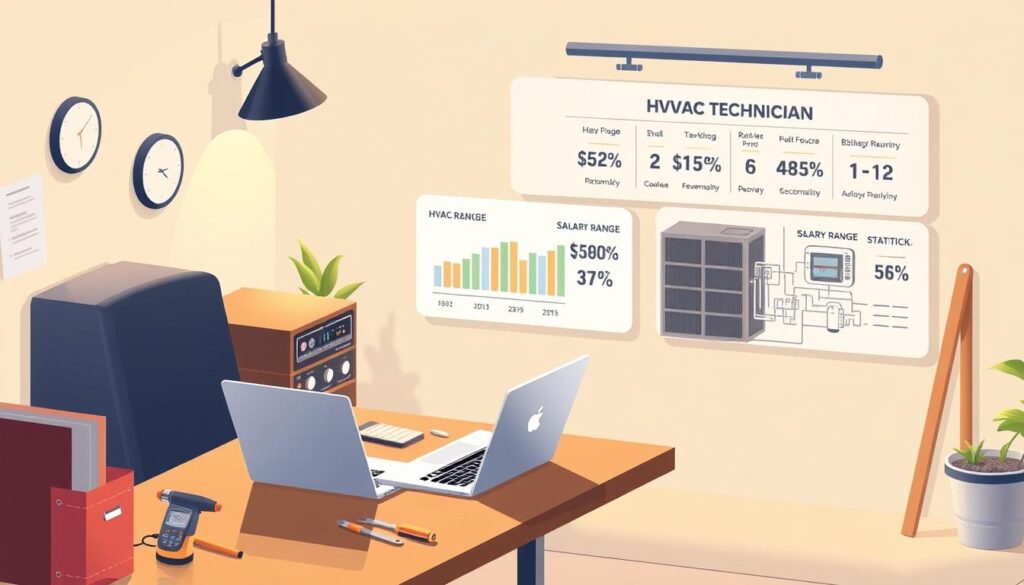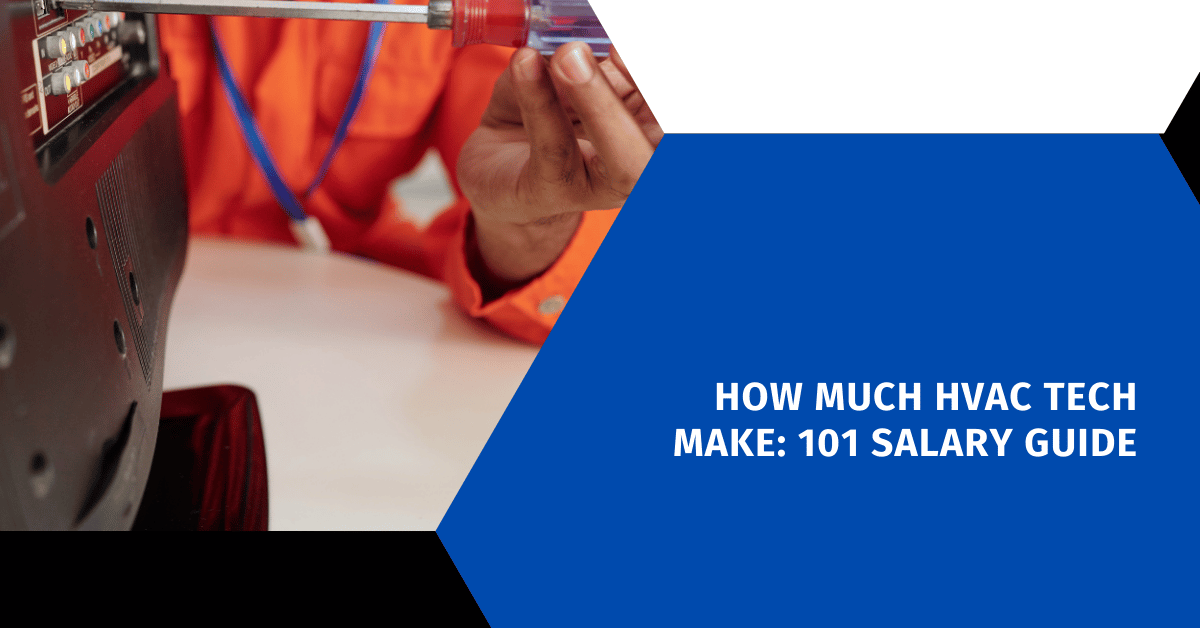Affiliate Disclosure
HVAC Guide Guys is a participant in the Amazon Services LLC Associates Program, an affiliate advertising program designed to provide a means for sites to earn advertising fees by advertising and linking to Amazon.
How Much HVAC Tech Make? Ever wondered how to make a good living in a growing trade? HVAC technicians keep America comfortable. They have more opportunities than you might think.

Exploring HVAC technician salaries, you’ll find a career with great earning chances. They work on everything from home setups to big commercial systems. HVAC techs are key to keeping places comfy across the U.S.
The salary for HVAC techs varies a lot. It depends on experience, where you work, and your specialty. They can make between $46,000 and $68,000 a year. Newbies start at about $22.47 an hour, while the most experienced can make up to $32.83 an hour.
Key Takeaways
- Average HVAC technician salary ranges from $46,000 to $68,000 annually
- Entry-level technicians earn approximately $22.47 per hour
- Experienced HVAC professionals can earn up to $32.83 per hour
- Career offers strong job growth with 5% projected increase
- Opportunities exist in residential, commercial, and specialized sectors
Table of Contents
Understanding the HVAC Technician Role
HVAC technicians keep indoor spaces comfy in homes and businesses. Knowing the job’s details is key to your earning power in this field.
Working in HVAC tech means being both tech-savvy and physically strong. Your income depends on mastering a wide range of skills, not just fixing things.
Primary Responsibilities
- Install heating and cooling systems
- Diagnose mechanical problems
- Perform routine maintenance
- Repair electrical and mechanical components
- Ensure system efficiency and safety
Essential Skills for Success
To succeed, HVAC techs need a mix of technical know-how and hands-on skills. You’ll need:
- Mechanical aptitude
- Problem-solving capabilities
- Physical stamina
- Strong communication skills
- Technical training and certifications
Industry Landscape
The HVAC industry is booming, with lots of job opportunities. New tech and energy-saving needs open up good-paying careers.
Knowing modern HVAC systems well can really up your earning game in this field.
Explore Our HVAC Shop
Looking for top-rated HVAC tools, parts, and accessories? Visit our shop and find the perfect solution for your needs.
Visit the ShopAverage HVAC Technician Salary Ranges Nationwide
Understanding the hvac technician salary landscape is key for those thinking about this career. The national average gives a full picture of what you might earn in the HVAC field.
In 2023, HVAC technicians can earn a wide range of salaries. The median annual salary is about $50,590. But, your pay can change a lot based on experience, location, and what you specialize in.
| Salary Percentile | Annual Earnings |
|---|---|
| Bottom 10% | $32,300 |
| Median | $50,590 |
| Top 10% | $82,630 |
Looking at the salary ranges shows great opportunities:
- New technicians start at about $32,300 a year
- Those in the middle make around $50,590
- Top technicians can earn up to $82,630
Your salary can increase with more skills, certifications, and experience. The HVAC field offers good pay and chances for career growth for those who are committed.
Factors That Influence HVAC Tech Earnings
Understanding what affects hvac tech income is key to making more money in this field. Many things influence how much HVAC installers earn. These factors vary in different professional settings.
Your earnings as an HVAC technician depend on several important factors. These factors can greatly affect your total pay.
Geographic Location’s Impact on Earnings
Your location greatly affects your income as an HVAC technician. Cities with high demand for climate control services pay more. States like California, New York, and Texas offer better pay for HVAC workers.
- Metropolitan areas offer 15-25% higher wages
- Regions with extreme climates require more HVAC services
- Cost of living directly influences salary ranges
Experience Level Considerations
Your career growth affects your earnings. New technicians earn less, while experienced ones earn more.
- 0-2 years: Basic salary range
- 3-5 years: Increased earning
- 5+ years: Senior technician rates
Industry Specialization Effects
Working in specialized HVAC areas can increase your income. Commercial and industrial HVAC jobs often pay more than residential ones.
- Commercial HVAC: Higher complexity, better pay
- Industrial refrigeration specialists earn premium rates
- Green technology expertise increases market value
Strategic career development can significantly enhance your earning in the HVAC industry.
Explore Our HVAC Shop
Looking for top-rated HVAC tools, parts, and accessories? Visit our shop and find the perfect solution for your needs.
Visit the ShopHow Much HVAC Tech Make by Experience Level

Your earnings as an HVAC service technician grow with experience. Knowing how pay changes can help you plan your career. It also sets realistic income goals.
Starting in HVAC, you’ll find entry-level jobs with good pay. Technicians with 0-5 years of experience make about $22 an hour. This equals around $45,760 a year. These early years are key for learning the basics and getting hands-on experience.
- Entry-Level (0-5 years):
- Hourly rate: $22
- Annual salary: $45,760
- Focus on learning core skills
- Mid-Career (6-9 years):
- Hourly rate: $27.65
- Annual salary: $57,512
- Increased technical expertise
- Senior/Management (10+ years):
- Hourly rate: $32.83
- Annual salary: $68,286
- Advanced specializations
With more experience, your earnings will rise. Mid-career technicians, with 6-9 years of experience, earn about $27.65 an hour. This shows the value of your skills and reliability to employers.
Reaching senior or management levels after 10 years boosts your income a lot. You might earn $32.83 an hour. You also get chances for more money through specializations and advanced certifications.
Pro Tip: Keep improving your skills and get specialized certifications. This can speed up your salary growth in HVAC.
Regional Salary Variations Across States
Your HVAC technician salary can change a lot based on where you work. Different states offer unique opportunities and pay for skilled HVAC pros. Knowing these regional differences helps you make better career choices.
When looking at HVAC technician salaries, some states really stand out:
- Alaska: Highest average earnings in the industry
- Hawaii: Competitive wages due to unique climate demands
- Washington: Strong market for HVAC tech income
- Massachusetts: Robust technological infrastructure
- Connecticut: Premium compensation for skilled technicians
Highest Paying States for HVAC Technicians
States with higher salaries often have certain traits. Cities with complex infrastructure, extreme weather, and strong industries pay more. These places need advanced HVAC systems and special skills.
Cost of Living Adjustments
Remember, salary numbers don’t tell everything. A high salary in an expensive city might not go as far as a lower wage in a cheaper area. Always think about the cost of living when looking at job markets.
“Location can make a significant difference in your HVAC career earnings.”
By choosing your work location wisely, you can boost your HVAC technician salary. This can lead to long-term financial security in this exciting field.
Explore Our HVAC Shop
Looking for top-rated HVAC tools, parts, and accessories? Visit our shop and find the perfect solution for your needs.
Visit the ShopCareer Advancement and Salary Growth

Your HVAC career offers exciting paths to increase your earnings and professional development. As you gain experience, many opportunities emerge to boost your hvac career earnings. These opportunities help expand your professional reach.
HVAC technicians can progress through several career stages that significantly impact their income. Each stage offers a chance to earn more:
- Entry-level apprentice
- Journeyman technician
- Senior technician
- Specialized systems expert
- HVAC business owner
Each career stage brings substantial salary increases. For example, hvac journeyman earnings can jump dramatically after getting advanced certifications and skills.
| Career Stage | Typical Salary Range | Key Requirements |
|---|---|---|
| Apprentice | $30,000 – $40,000 | Technical school training |
| Journeyman | $50,000 – $70,000 | State certification |
| Master Technician | $70,000 – $90,000 | Advanced specializations |
Investing in continuous education can speed up your career. Consider getting more certifications in areas like green technology, industrial systems, or building automation. This can increase your market value.
Entrepreneurial HVAC professionals can start their own businesses. They can earn six-figure incomes by building a strong client base and reputation for exceptional service.
Benefits and Additional Compensation
When looking at hvac contractor pay, don’t just focus on the base salary. HVAC technicians often get more than just a paycheck. They receive packages that boost their earnings a lot.
Your earnings as an HVAC installer are more than just a salary. Many employers give great benefits. These benefits can really add value to your job package.
Health Insurance and Retirement Options
Top HVAC employers offer great benefits. These usually include:
- Comprehensive medical insurance
- Dental and vision coverage
- 401(k) retirement plans with company matching
- Life insurance options
“The right benefits package can add thousands of dollars in value to your hvac installer wages,” says industry expert Mark Thompson.
Overtime and Bonus Opportunities
HVAC technicians can earn more through extra pay:
- Emergency call overtime rates
- Seasonal peak season bonuses
- Performance-based incentives
- Tool and equipment allowances
Approximately 89% of HVAC professionals receive non-wage benefits that enhance their total compensation package. When looking at jobs, think about all the financial benefits you’ll get, not just your salary.
Explore Our HVAC Shop
Looking for top-rated HVAC tools, parts, and accessories? Visit our shop and find the perfect solution for your needs.
Visit the ShopComparing HVAC Salaries to Similar Trades
Exploring career options in skilled trades? It’s key to know how hvac trade income stacks up against others. HVAC techs earn competitive salaries, rivaling those of plumbers and electricians.
Let’s look at salary comparisons across skilled trades:
| Trade | Entry-Level Hourly Rate | Experienced Hourly Rate |
|---|---|---|
| HVAC Technician | $22.15 | $32.83 |
| Plumber | $21.47 | $31.16 |
| Electrician | $22.38 | $29.62 |
Your hvac technician salary looks good compared to other trades. Several factors affect these earnings:
- Specialized skills in HVAC systems
- Growing demand for climate control technologies
- Opportunities for advanced certifications
- Potential for industry specialization
Pro tip: Specializing in commercial HVAC or refrigeration can boost your earnings.
While plumbers and electricians have solid careers, HVAC techs have an edge. Your skills in managing complex systems can lead to higher earnings as you gain experience.
Certification Impact on Earning Earning Technician Income
Getting certified can really boost your hvac tech income. These certifications can increase your hvac service technician pay. They also open up better job opportunities in the HVAC field.
Certifications show you’re an expert and serious about your work. They prove your skills and make you more appealing to employers and clients.
- EPA 608 Certification: Essential for handling refrigerants
- NATE (North American Technician Excellence) Certification: Proves advanced technical knowledge
- HVAC/R Certification: Covers heating and cooling systems
- RSES (Refrigeration Service Engineers Society) Certification: Specialized refrigeration skills
Certified HVAC technicians usually make 15-25% more than those without certifications. Getting certified is a smart move for your career.
| Certification | Potential Salary Increase | Career Impact |
|---|---|---|
| EPA 608 | 5-10% | Legal need for refrigerant handling |
| NATE | 15-20% | Advanced tech recognition |
| HVAC/R | 10-15% | Wide system knowledge |
| RSES | 8-12% | Special refrigeration skills |
Keep learning to stay sharp and earn more. Invest in certifications to stand out in the HVAC job market.
Explore Our HVAC Shop
Looking for top-rated HVAC tools, parts, and accessories? Visit our shop and find the perfect solution for your needs.
Visit the ShopStarting Your Career as an HVAC Technician
Starting a career in HVAC is exciting for those who love technical work and want a steady income. Your journey begins with education and professional steps that can boost your earnings.
To start, consider these key steps:
- Complete a high school diploma or equivalent
- Enroll in vocational training or community college HVAC programs
- Participate in a thorough apprenticeship program
- Get the necessary state certifications
Focus on learning technical skills in school. Math, physics, and mechanical sciences are key. Trade schools and community colleges have programs to kickstart your career.
Apprenticeships are vital for hands-on experience. They last 3-5 years, mixing classroom learning with real-world training. You’ll learn from pros and gain the skills needed to succeed.
“The HVAC industry offers a stable career path with strong growth for dedicated professionals.” – Industry Expert
Certification opens doors to better jobs and higher pay. Get credentials from groups like NATE (North American Technician Excellence) to show your skills and stand out.
Success in HVAC depends on learning, technical skills, and professional growth. Start your career now and see your earnings grow.
Conclusion
Exploring the earnings of HVAC tech shows a promising career path. The salary ranges highlight the chance for growth and development. Your journey in this field can bring both financial and personal rewards.
Knowing what affects your earnings is key to planning your career. Location, certifications, and more can boost your income. HVAC pros who keep learning and improving their skills can reach new heights.
Green tech and energy efficiency are creating more job opportunities. By investing in your education and getting the right certifications, you can secure a stable, well-paying job. The HVAC industry not only offers good pay but also the chance to make a real difference.
Your future in HVAC tech is bright. Whether you’re just starting or looking to move up, there are many chances for success. Focus on improving your skills, exploring different areas, and aim for long-term success in this vital field.

